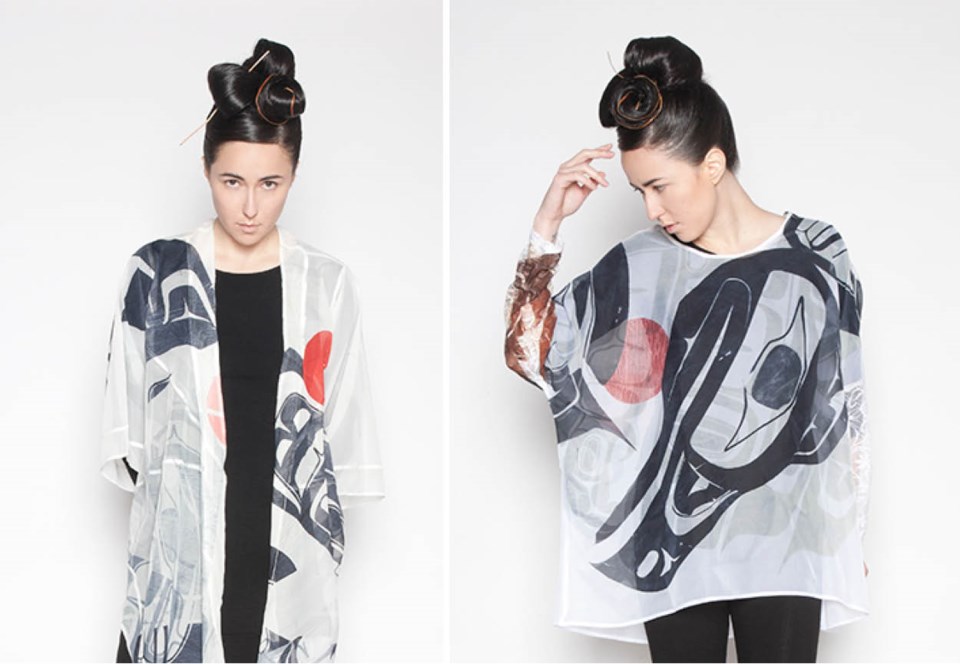Joleen Mitton has been hiding all her life. At school in East Van, she would rarely talk about her Cree background and when she did, the usual response was rejection or worse. When she told her first boyfriend she was First Nations, he used an ethnic slur, so she punched him. Later, she was model-scouted while waiting in line for a free smoothie. Aged 15, she began travelling the world, modelling for brands like Lancôme and Vivienne Westwood, feigning an interest in fashion. “I was a tomboy and a basketball player who wore sporty, hip-hop-style clothing, and I had always been stocky. Then I grew tall and thin and the fashion world got interested in me,” she says. “One of my first jobs was modelling for a lingerie brand in Taiwan. I had always drawn strength from being a strong athlete, and was only just coming to terms with my femininity. Suddenly, people were telling me to be thin and sexy. I felt like a piece of meat.”
Not only was modelling going against her real interests but she was still expected to conceal her heritage. “My agency would tell people that I was half-Asian – there are even stories in Hong Kong magazines that say that,” she says.
After nine years in the fashion industry, she quit. “I had a kind of identity crisis at 25. I had developed an eating disorder because of the constant pressure to starve myself for three days before a big shoot or whatever. I was having cold sweats at night. I’d had enough of being someone else’s product. I was lonely – I was interested in different things to the other girls and I just didn’t want to be there.”
On returning to Vancouver, she began a new career as a support worker for people in the First Nations community – her first opportunity to really learn more about her own heritage (her mom had been raised in foster care, so Mitton was not familiar with Cree culture as a child). But at this point, she felt it was necessary to conceal her model past. “I thought that there would be a kind of judgment of me,” she explains.
Initially, her work was with adults, but she soon learned how hard it was to break ingrained patterns that had been established over a lifetime. “Many times, people returned to drugs – four of my ex-clients have died of fentanyl overdoses – and, in the end, I found it too heartbreaking,” she explains.
She started working with the Urban Butterflies, a group run by the Pacific Association of First Nations Women (PAFNW) for girls aged nine to 13 who are in foster care. “With kids, you can mould them and be that fork in the road – show them they don’t have to grow up to be their parents.”
When she became involved in the PAFNW’s Mentor Me program for 14- to 25-year-olds ageing out of foster care, she faced new challenges. “We started to lose them. They weren’t interested in resumés and life skills – all the things we were trying to teach them. We had some deaths to suicide and some drug overdoses.”
At this point, Mitton decided she needed to share her own experiences, from her "crazy" childhood to her escape into another kind of craziness – modelling. “I wanted to show them what I’d done and let them know they have options – to use my model background as a teaching resource,” she explains. This was the seed of the idea that led to Vancouver’s first Indigenous Fashion Week, which takes place next week.
For this, Mitton has stopped hiding and brought together all the threads of her identity – as a First Nations woman, fashion insider and someone who works with young people. The event showcases more than 25 designers in 20 hours of shows over four daysand the majority of models are from the Mentor Me programme. “It’s about exposure for our designers who want to be seen on a good stage. It’s also to prepare the girls from Mentor Me for the world of work. It’s not about them becoming models – it’s more of a way to show them how you show up for a job interview and walk with pride, having the confidence to enter any room,” Mitton says.
Some non-First Nations designers are being featured, but is reconciliation also a goal for the event? Mitton says no. “Reconciliation is the scary R word,” she says. “This is a step in the right direction, for sure, but I think we’re still a couple of generations away from genuinely achieving that.”
Mitton says there is a true First Nations aesthetic established in fashion – she cites Yukon designer Sho Sho Esquiro’s traditional beading and Squamish Pam Baker’s totem-influenced pieces, and says the work of Jeneen Frei Njootli, a Vuntut Gwich’in artist, reminds her of the Aurora Borealis. Then there are the ubiquitous blanket scarves, moccasins and other First Nations-influenced pieces ever present on the high street. Is it acceptable for non-Indigenous people to wear these designs, or does that cross into cultural appropriation? “Sure, wear it,”says Mitton. “You’re doing it anyway and that’s OK. We just want you to buy it from us.”
• Vancouver Indigenous Fashion Week is from July 26 to July 29 at the Queen Elizabeth Theatre. Admission is free. Info and schedule available here.



